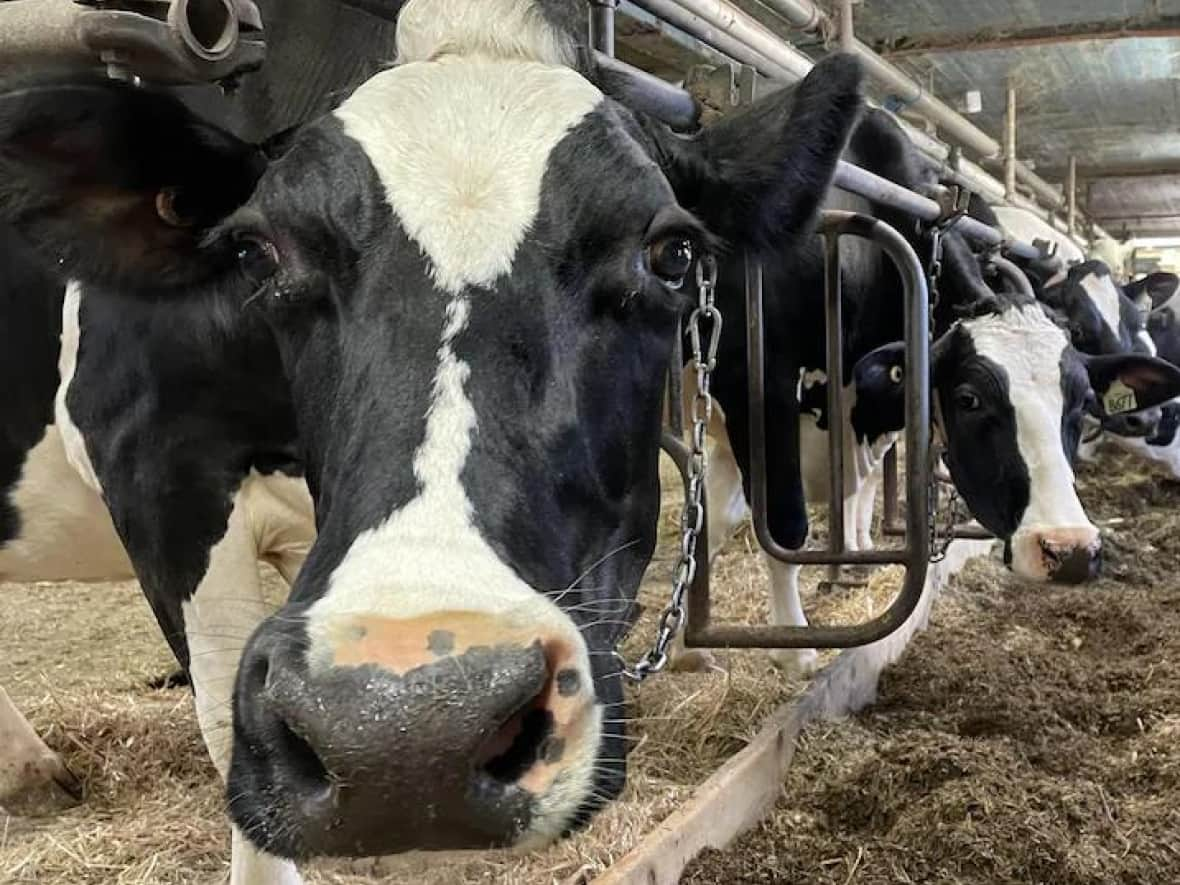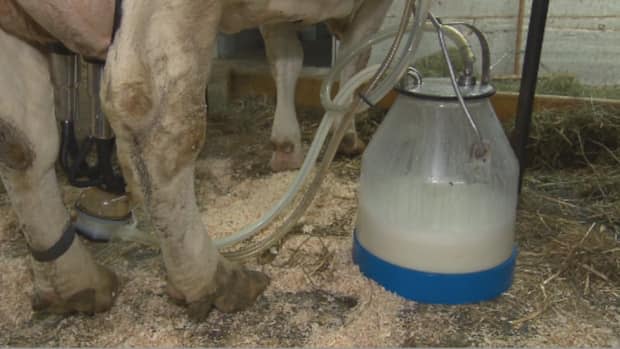2 million litres of milk wasted since Granby, Que. factory strike

Two million litres of milk have been thrown away since an indefinite general strike broke out on Wednesday at an Agropur plant in Granby, Que.
The labour dispute is forcing dairy farms to sacrifice production by thousands of litres a day.
"It's really the fruit of our labour that is being thrown away," said milk farmer Raphael Spani, co-owner of a farm family dairy.
Normally, a truck picks up milk produced at Spani's farm and transports it to the Agropur cheese plant on Omer-Deslauriers Street, in Granby, where it's processed before being sold. But with the strike, Spani no longer knows where to turn.
"Finding alternatives is difficult," he said, referring to other processing factories that are already operating at maximum capacity.

The Granby plant processes 800,000 litres of milk per day, which represents 10 per cent of all production in Quebec.
Yannick Grégoire, assistant director of communications for the Fédération des producteurs de lait du Québec, says that when a strike is called at an "important" factory like Granby, "we have to find other takers."
This involves approaching factories to see if they can process more milk, and looking for buyers outside Quebec. Producers can then try to sell their product to food banks and, if necessary, use what's left to feed their animals.
"It's after all these efforts, when there are no other options left, that unfortunately the milk has to be thrown away," he said.
According to Grégoire 70 million litres of milk are produced each week in Quebec.

"The fact remains that it's too much," he said, adding that the litres of unsold milk are synonymous with lost income for producers.
He's calling on unions and employers "to think outside the box" to help producers who are caught between a rock and a hard place.
"The producers find themselves having to bear the brunt of this labour dispute when, in the end, they are not sitting at the table to negotiate the working conditions of this plant," he said."
Not 'on strike for fun'
Although he says he's sorry for the strike leading to milk going to waste, the union adviser Bernard Cournoyer says workers will remain on strike as long as the employer maintains its demands.
"We don't go on strike just for fun," Cournoyer said. "If we go on strike, it's because there are important issues that directly target the families of strikers."
The collective agreement for the 250 workers at the Agropur plant in Granby expired nearly a year ago, and scheduling remains a sticking point in negotiations.

For union president Daniel Chaput, maintaining the schedules in effect since the 1980s is essential to plant employees' quality of life.
"The work schedules we currently have cover every day of the week, 365 days a year," he said. "We guarantee production and quality every day, but we're not ready to change a schedule that satisfies all of our members."
Mylène Dupéré, vice-president of corporate communications at Agropur, refused to comment on the status of talks with the union. She says, however, that the dairy cooperative, whose members are dairy farmers, was doing "everything possible" to reach a "quick" settlement.
In the meantime, the cooperative says it is working closely with Quebec producers to limit food waste.
"We try as much as possible to distribute the milk in our other factories, but you will understand that the processing capacity is limited."
Incentive for change
The milk waste in Granby isn't an isolated phenomenon.
According to agri-food expert Sylvain Charlebois, 100 to 300 million litres of milk are thrown away in Canada each year, whether due to a strike or other factors.
Charlebois cites the existence of technologies such as ultra-high temperature processing (UHT), which allow the milk to be preserved for several months.
He also notes that strategic reserves exist for other dairy products such as butter and cheese in case of unforeseen circumstances.
However, he says that the dairy product supply management system offers no incentive to "change things," since producers know "very well" that they will eventually be compensated.
"In Canada, unlike other countries, milk is almost a public good ... we subsidize part of the production so the milk is paid for by Canadians," he said.
Charlebois says that Canada should change the supply management system in such a way as to make "wasting milk on a farm illegal," especially since this waste is taking place at a time when groceries are more expensive.
"Dairy prices are going up 10 to 15 per cent right now," he said. "The dairy section is a big deal for many people on incredibly tight budgets. And it's these taxpayers who pay for the milk that goes down the drain."


